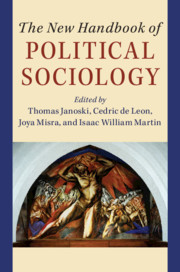Book contents
- The New Handbook of Political Sociology
- The New Handbook of Political Sociology
- Copyright page
- Dedication
- Contents
- Tables
- Figures
- Contributors
- Acknowledgments
- Introduction
- I Theories of Political Sociology
- 1 Power
- 2 Conflict Theories in Political Sociology
- 3 The Promise of Field Theory for the Study of Political Institutions
- 4 Culture in Politics and Politics in Culture
- 5 Political Sociology and the Postcolonial Perspective
- 6 Gender, State, and Citizenships
- 7 Theories of Race, Ethnicity, and the Racial State
- 8 Toward the Convergence of Culture and Political Economy?
- 9 Tasks for the Political Sociology of the Next Ten Years
- II Media Explosion, Knowledge as Power, and Demographic Reversals
- III The State and Its Political Organizations
- IV Civil Society: The Roots and Processes of Political Action
- V Established and New State Policies and Innovations
- VI Globalization and New and Bigger Sources of Power and Resistance
- Index
- References
5 - Political Sociology and the Postcolonial Perspective
from I - Theories of Political Sociology
Published online by Cambridge University Press: 22 February 2020
- The New Handbook of Political Sociology
- The New Handbook of Political Sociology
- Copyright page
- Dedication
- Contents
- Tables
- Figures
- Contributors
- Acknowledgments
- Introduction
- I Theories of Political Sociology
- 1 Power
- 2 Conflict Theories in Political Sociology
- 3 The Promise of Field Theory for the Study of Political Institutions
- 4 Culture in Politics and Politics in Culture
- 5 Political Sociology and the Postcolonial Perspective
- 6 Gender, State, and Citizenships
- 7 Theories of Race, Ethnicity, and the Racial State
- 8 Toward the Convergence of Culture and Political Economy?
- 9 Tasks for the Political Sociology of the Next Ten Years
- II Media Explosion, Knowledge as Power, and Demographic Reversals
- III The State and Its Political Organizations
- IV Civil Society: The Roots and Processes of Political Action
- V Established and New State Policies and Innovations
- VI Globalization and New and Bigger Sources of Power and Resistance
- Index
- References
Summary
What can postcolonial theory teach us about politics and society? Part of that depends upon what “postcolonial theory” is. First and foremost, it must be clarified that postcolonial theory is not reducible to a singular “theory” in the conventional sense. It is not a set of ordered hypotheses about the social world or a “singular logically integrated causal explanation” (Calhoun 1995: 5). It is not concerned with meeting Homans’ requirement that “causal explanation” constitutes theory (Homans 1964). While it might include certain causal statements, postcolonial theory is not restricted to them. Postcolonial theory is better thought of as a perspective or worldview. To draw from Abend’s definition of theory, it is a “Weltanschauung, that is, an overall perspective from which one sees and interprets the world” (Abend 2008). From this perspective, one might derive hypothetical causal statements.
- Type
- Chapter
- Information
- The New Handbook of Political Sociology , pp. 132 - 152Publisher: Cambridge University PressPrint publication year: 2020
References
- 1
- Cited by

